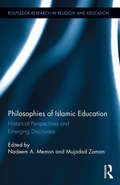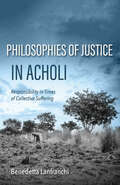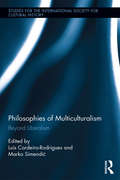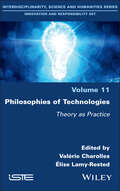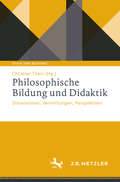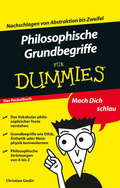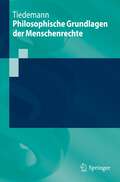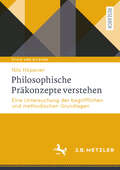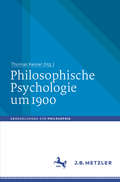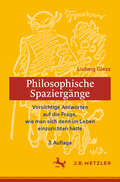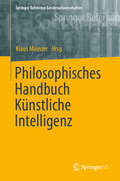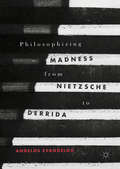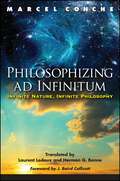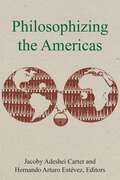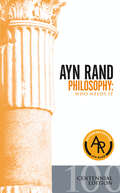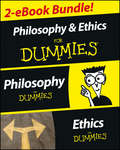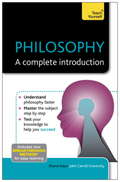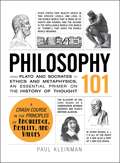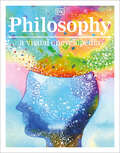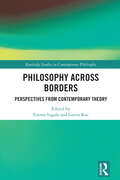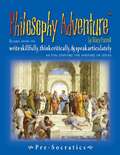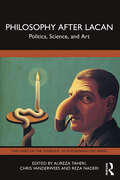- Table View
- List View
Philosophies of Islamic Education: Historical Perspectives and Emerging Discourses (Routledge Research in Religion and Education #4)
by Mujadad Zaman Nadeem A. MemonThe study of Islamic education has hitherto remained a tangential inquiry in the broader focus of Islamic Studies. In the wake of this neglect, a renaissance of sorts has occurred in recent years, reconfiguring the importance of Islam’s attitudes to knowledge, learning and education as paramount in the study and appreciation of Islamic civilization. Philosophies of Islamic Education, stands in tandem to this call and takes a pioneering step in establishing the importance of its study for the educationalist, academic and student alike. Broken into four sections, it deals with theological, pedagogic, institutional and contemporary issues reflecting the diverse and often competing notions and practices of Islamic education. As a unique international collaboration bringing into conversation theologians, historians, philosophers, teachers and sociologists of education Philosophies of Islamic Education intends to provide fresh means for conversing with contemporary debates in ethics, secularization theory, child psychology, multiculturalism, interfaith dialogue and moral education. In doing so, it hopes to offer an important and timely contribution to educational studies as well as give new insight for academia in terms of conceiving learning and education.
Philosophies of Justice in Acholi: Responsibility in Times of Collective Suffering (World Philosophies)
by Benedetta LanfranchiSince 2008 Ugandans residing in the northern region of Acholiland have been faced with the uncertainties of justice stemming from the twenty-year civil war waged between the Ugandan government and Joseph Kony's Lord's Resistance Army (LRA). Seeking accountability and reconciliation within their communities, Acholi and non-Acholi have had to grapple with large-scale practical and philosophical questions: Whose legal system should deliver justice for victims, and what are the aims and responsibilities of justice as a concept?Philosophies of Justice in Acholi focuses on Acholi traditional mechanisms of justice (ATJMs), which became the central framework for jurisprudence outlined in the peace agreements that were brokered from 2006 to 2008. Framing community members' responsibilities in terms of their ancestral beings has facilitated a justice process that understands the inseparable relations between individuals and groups and thus provides pathways to reclaim social, moral, and material lives. While ATJMs have thus far fallen short of addressing national and global polities' responsibilities in the conflict, their core premises hold promise for defining Uganda's still-developing political justice process and for humans everywhere seeking justice.Delving into understandings of fairness, responsibility, and group identity, Philosophies of Justice in Acholi reveals that justice, and its effect on collective existence, is always political.
Philosophies of Multiculturalism: Beyond Liberalism (Studies for the International Society for Cultural History #9)
by Luís Cordeiro-Rodrigues Marko SimendićThis edited collection offers a comparative approach to the topic of multiculturalism, including different authors with contrasting arguments from different philosophical traditions and ideologies. It puts together perspectives that have been largely neglected as valid normative ways to address the political and moral questions that arise from the coexistence of different cultures in the same geographical space. The essays in this volume cover both historical perspectives, taking in the work of Hobbes, Tocqueville and Nietzsche among others, and contemporary Eastern and Western approaches, including Marxism, anarchism, Islam, Daoism, Indian and African philosophies.
Philosophies of Technologies: Theory as Practice
by Valérie Charolles Élise Lamy-RestedIn the space of a century, technologies have acquired unprecedented power. The result of these developments is a new form of the world. These transformations test our capacities and generate new crises with multiple issues at stake. Drawing on the lessons of a long history, Philosophies of Technologies examines the continuities and disruptions brought about by the power of contemporary technical systems, without reducing them to the digital age. It draws together 13 authors from different schools of thought and proposes tools that combine productive technology with sustainability, innovation and responsibility. This book wagers that, in the face of the sprawling and ever-changing deployment of technologies, philosophy is able to respond to the changes that offer so many opportunities to shape our future. Today, technologies need a philosophical moment.
Philosophinnen der griechischen Antike: Eine Spurensuche (Frauen in Philosophie und Wissenschaft. Women Philosophers and Scientists)
by Maria NühlenIn diesem Buch werden 39 Philosophinnen der griechischen Antike in ihrem Denken vorgestellt, ihre Werke analysiert sowie interpretiert und ihnen ein Platz in der abendländischen Philosophiegeschichte zugewiesen. Als Anliegen formuliert die Autorin: Die Rehabilitierung der in Vergessenheit geratenen Arbeiten von Philosophinnen und die Ergänzung der abendländischen Philosophie um die nicht berücksichtigten philosophischen Beiträge eben dieser Frauen geht es. Eine kritische Analyse im kultur- und philosophiehistorischen sowie im lebensweltlichen Kontext der Frauen bildet die Grundlage. Durch eine dezidierte Verortung in historische Zeiten, Orte und kulturelle Räume kann sich uns die Lehre der Philosophinnen differenzierter erschließen. Das Klischee der ungebildeten und von der Außenwelt abgeschlossenen Lebenswelt der Griechinnen jener Zeit wird als Mythos entlarvt, denn es traf nur zum Teil auf die Athenerin der klassischen Zeit zu, nicht aber für die Frauen anderer Kulturkreise, aus denen 38 der hier vorgestellten Philosophinnen stammen. In der Spurensuche geht die Autorin akribisch und systematisch den Quellen nach und diskutiert kritisch das Material, das von der Antike bis zur Gegenwart reicht. Sie durchforstet Enzyklopädien, historische Texte, Fragmente und Briefe, analysiert die ältesten Quellen bis hin zur Rezeptionsgeschichte.Das Werk eignet sich sowohl für das philosophische Fachstudium als auch für den Unterricht in Schulen, dürfte darüber hinaus für einen relativ großen Kreis von Lesenden der Philosophie von Interesse sein.
Philosophische Bildung und Didaktik: Dimensionen, Vermittlungen, Perspektiven (Ethik und Bildung)
by Christian TheinDie Beiträge dieses Bandes betrachten die Verbindung zwischen bildungsphilosophischen und philosophiedidaktischen Themen. So werden im ersten Teil "Philosophie und Bildung" aus der Philosophie heraus Konzepte und Ideen entwickelt, die für theoretische und praktische Fragen der Bildung von Relevanz sind. Der zweite Teil enthält Beiträge, die das besondere Verhältnis von philosophischer Bildung und Philosophiedidaktik in den Blick nehmen. Der dritte Themenblock schlägt dann die Brücke von den fachdidaktischen Konzepten und Ideen in den konkreten Unterricht: Philosophiedidaktik und philosophische Unterrichtspraxis.
Philosophische Grundbegriffe für Dummies (Für Dummies)
by Christian GodinPhilosophische Texte sind alles andere als leichte Gutenachtlektüre. Kein Wunder, denn hier kommt es buchstäblich auf jeden Buchstaben an. Transzendent ist noch lange nicht transzendental! Und absolut nicht absolutistisch! Zum Glück gibt es einen Wegweiser im Dschungel des Fachchinesisch. "Philosophische Grundbegriffe für Dummies" liefert Definitionen und Erläuterungen von A bis Z und in verständlicher Sprache. Finden Sie heraus, warum die Fetzen fliegen, wenn ein Rationalist und ein Empirist sich streiten!
Philosophische Grundlagen der Menschenrechte (Springer-Lehrbuch)
by Paul TiedemannDieses Lehrbuch stellt zunächst eine Reihe von klassischen philosophischen Ansätzen vor, um zu zeigen, dass sie als Grundlage für die Menschenrechte ungeeignet sind. Nur das Konzept der Menschenwürde - basierend auf der kantischen Unterscheidung von Preis und Würde – ist als Grundlage geeignet. Die Ableitung der Menschenrechte aus dem Prinzip der Menschenwürde erlaubt es, das entscheidende Merkmal der Menschenrechte zu identifizieren, nämlich den Schutz der Personalität. Dies wiederum ermöglicht es, (1) die Menschenrechte sinnvoll zu interpretieren, (2) zwischen echten und unechten moralischen Menschenrechten zu unterscheiden, (3) den Schutzumfang vieler kodifizierter Menschenrechte nach den Kriterien „Kern“ und „Hof“ zu differenzieren und bietet (4) einen Ausgangspunkt für die „Entdeckung“ neuer, ungeschriebener Menschenrechte. Diese philosophische Grundlage ermöglicht eine grundlegende Neubewertung der Rechtsprechung zu den Menschenrechten, die es letztlich ermöglichen wird, sie im Hinblick auf Rechtssicherheit, Klarheit und Schlüssigkeit zu verbessern.Das Lehrbuch richtet sich in erster Linie an fortgeschrittene Studierende der Rechtswissenschaft, die an einem tieferen Verständnis der Menschenrechte interessiert sind. Es eignet sich aber auch für Studierende der Geisteswissenschaften und für alle, die im politischen oder sozialen Bereich tätig sind und sich mit Menschenrechten und deren Durchsetzung befassen.Jedes Kapitel ist in vier Teile gegliedert: Zusammenfassungen, Vorlesung, empfohlene Lektüre und Fragen, um das Verständnis des Lesers zu überprüfen. Musterantworten sind am Ende des Buches enthalten.
Philosophische Präkonzepte verstehen: Eine Untersuchung der begrifflichen und methodischen Grundlagen (Ethik und Bildung)
by Nils HöppnerPhilosophische Präkonzepte sind Vorannahmen, die Lernende zu einem philosophischen Problem haben, bevor sie sich tiefergehend mit den etablierten philosophischen Positionen zu diesem Problem im Philosophie-Unterricht auseinandersetzen. In der philosophiedidaktischen Forschungsdiskussion werden Präkonzepte als Ausgangspunkt der philosophischen Urteilsbildung der Lernenden betrachtet. Die vorliegende Untersuchung zielt darauf ab, das Verstehen philosophischer Präkonzepte theoretisch zu beschreiben und zu erklären. Unter Bezug auf philosophische und didaktische Theoreme werden die begrifflichen und methodischen Grundlagen dieses Verstehens untersucht. Es wird herausgearbeitet, welche Fähigkeiten und Praktiken seitens des Lehrenden erforderlich sind, um die Präkonzepte der Lernenden gleichsam umfassend sowie differenziert zu verstehen. In diesem Zusammenhang wird gezeigt, dass es sich beim Verstehen philosophischer Präkonzepte um eine spezifische Form des Lehrens der Philosophie handelt. Dieses Lehren gilt dem Anspruch, die Lernenden in einen rationalen, philosophischen Dialog zu involvieren und zur eigenständigen Urteilsbildung zu befähigen.
Philosophische Psychologie um 1900 (Abhandlungen zur Philosophie)
by Thomas KesselDieser Band stellt die eigentümlichen Mischungsverhältnisse natur- und geisteswissenschaftlicher Perspektiven im Feld der philosophischen Psychologien um 1900 ins Zentrum. Diese Konzeptionen, die den engen Rahmen des Psychologismus-Streites überschreiten und ihn gleichwohl kontextualisieren, werden durch Beiträge zu Franz Brentano, Wilhelm Dilthey, Carl Stumpf, Theodor Lipps, Wilhelm Wundt, Oswald Külpe, Edmund Husserl, Wilhelm Windelband, Paul Natorp und Nicolai Hartmann repräsentiert.
Philosophische Spaziergänge: Vorsichtige Antworten auf die Frage, wie man sich denn im Leben einzurichten hätte
by Ludwig GieszLudwig Giesz (1916–1985) verbindet einen ausgeprägten philosophischen Spürsinn für das Hinter- und Abgründige der menschlichen Existenz mit einer selten gewordenen stilistischen Brillanz. Die dritte Auflage der „Philosophischen Spaziergänge“ bietet eine erweiterte und in jeder Hinsicht außergewöhnliche Sammlung von Essays und Radiovorträgen über Autoren und Themen aus der Welt der Philosophie. Giesz präsentiert kongeniale und ebenso heitere wie pikante Darstellungen von Autoren und Themen philosophischer Literatur aus Geschichte und Gegenwart. Ähnlich wie Friedrich Nietzsche verrät sein Stil die Bevorzugung der kleinen Form, und ähnlich wie Sören Kierkegaard ist er eine Ausnahme unter den Vertretern seiner Zunft. Das Buch ist sowohl für Kennerinnen als auch für Liebhaber geeignet, die neugierig sind auf Philosophie mit Esprit.
Philosophisches Handbuch Künstliche Intelligenz
by Klaus MainzerDas Handbuch schlägt die Brücke von der Grundlagenforschung zum Orientierungswissen. Es greift damit die Bildungs- und Ausbildungsziele der bundesweiten MINT-Initiative auf, die Mathematik (M), Informatik (I), Naturwissenschaft (N) und Technik (T) als fachübergreifendes Schlüsselwissen für technisch-wissenschaftlich gestützte Gesellschaften versteht. Additives Wissen und Ausbildung in getrennten Disziplinen der Mathematik, Informatik, Naturwissenschaft und Technik reichen aber nicht aus. In der Künstlichen Intelligenz wachsen diese Disziplinen mit den Human- und Sozialwissenschaften zusammen. Zunächst sollen die Grundlagen der KI-Forschung methodisch und begrifflich geklärt werden. Philosophie wird als Grundlagenforschung verstanden, die logisch und methodisch die Prinzipien von Wissenschaft und Technik untersucht. Daher handelt es sich um ein „Philosophisches Handbuch“ (in diesem Fall der KI) und nicht um eine Bindestrich-Philosophie, also ein Handbuch der Philosophie einer Einzelwissenschaft. Denken und Wissen selber und das Selbstverständnis der Menschen verändern sich durch KI grundlegend.
Philosophizing Madness from Nietzsche to Derrida
by Angelos EvangelouDrawing connections between madness, philosophy and autobiography, this book addresses the question of how Nietzsche's madness might have affected his later works. It also explores why continental philosophy after Nietzsche is so fascinated with madness, and how it (re)considers, (re)evaluates and (re)valorizes madness. To answer these questions, the book analyzes the work of three major figures in twentieth-century French philosophy who were significantly influenced by Nietzsche: Bataille, Foucault and Derrida, examining the ways in which their responses to Nietzsche's madness determine how they understand philosophy as well as philosophy's relation to madness. For these philosophers, posing the question about madness renders the philosophical subject vulnerable and implicates it in a state of responsibility towards that about which it asks. Out of this analysis of their engagement with the question of madness emerges a new conception of 'autobiographical philosophy', which entails the insertion of this vulnerable subject into the philosophical work, to which each of these philosophers adheres or resists in different ways.
Philosophizing ad Infinitum: Infinite Nature, Infinite Philosophy (SUNY series in Environmental Philosophy and Ethics)
by Marcel ConcheOne of France's preeminent historians of philosophy, Marcel Conche has written and translated more than thirty-five books and is recognized for his groundbreaking and authoritative work in Greek philosophy, as well as on Montaigne. In Philosophizing ad Infinitum, one of his most remarkable and daring books, Conche articulates a unique and powerful understanding of nature, inclusive of humanity, as infinite in time and space—ever self-renewing, eternal, and beyond complete understanding or control.In today's world the notion of infinity is at the core of the crisis humanity faces understanding nature. For the last two hundred years economies have been running at full speed, fueled by the implicit belief that natural resources are infinite; however, it is clear that they are not and that humanity needs to radically rethink the foundations of environmental and economic systems. Conche seeks to begin this rethinking, illustrating along the way insightful and sometimes unorthodox ideas about Plato, Aristotle, Epicurus, Montaigne, Nietzsche, Bergson, and others.
Philosophizing the Americas
by Jacoby Adeshei Carter and Hernando A. EstévezPhilosophizing the Americas establishes the field of inter-American philosophy. Bringing together contributors who work in Africana Philosophy, Afro-Caribbean philosophy, Latin American philosophy, Afro-Latin philosophy, decolonial theory, and African American philosophy, the volume examines the full range of traditions that have, separately and in conversation with each other, worked through how philosophy in both establishes itself in the Americas and engages with the world from which it emerges.The book traces a range of questions, from the history of philosophy in the Americas to philosophical questions of race, feminism, racial eliminativism, creolization, epistemology, coloniality, aesthetics, and literature. The essays place an impressive range of philosophical traditions and figures into dialogue with one another: some familiar, such as José Martí, Sylvia Wynter, Martin R. Delany, José Vasconcelos, Alain Locke, as well as such less familiar thinkers as Arturo Alfonso Schomburg, Hilda Hilst, and George Lamming. In each chapter, the contributors find fascinating and productive matrices of tension or convergence in works throughout the Americas. The result is an original and important contribution to knowledge that introduces readers from various disciplines to unfamiliar yet compelling ideas and considers familiar texts from novel and prescient perspectives. Philosophizing the Americas stands alone as a representation of current scholarly debates in the field of inter-American philosophy.
Philosophy
by Ayn Rand Leonard PeikoffThis collection of essays was the last work planned by Ayn Rand before her death in 1982. In it, she summarizes her view of philosophy and deals with a broad spectrum of topics. According to Ayn Rand, the choice we make is not whether to have a philosophy, but which one to have: rational, conscious, and therefore practical; or contradictory, unidentified, and ultimately lethal. Written with all the clarity and eloquence that have placed Ayn Rand's Objectivist philosophy in the mainstream of American thought, these essays range over such basic issues as education, morality, censorship, and inflation to prove that philosophy is the fundamental force in all our lives.
Philosophy
by Ayn Rand Leonard PeikoffThis collection of essays was the last work planned by Ayn Rand before her death in 1982. In it, she summarizes her view of philosophy and deals with a broad spectrum of topics. According to Ayn Rand, the choice we make is not whether to have a philosophy, but which one to have: rational, conscious, and therefore practical; or contradictory, unidentified, and ultimately lethal. Written with all the clarity and eloquence that have placed Ayn Rand's Objectivist philosophy in the mainstream of American thought, these essays range over such basic issues as education, morality, censorship, and inflation to prove that philosophy is the fundamental force in all our lives.
Philosophy & Ethics For Dummies 2 eBook Bundle: Philosophy For Dummies & Ethics For Dummies
by Tom Morris Christopher Panza Adam PotthastTwo complete eBooks for one low price! Created and compiled by the publisher, this Philosophy & Ethics bundle brings together two important titles in one, e-only bundle. With this special bundle, you’ll get the complete text of the following two titles: Philosophy For Dummies Philosophy For Dummies is for anyone who has ever entertained a question about life and this world. In a conversational tone, the book's author – a modern-day scholar and lecturer – brings the greatest wisdom of the past into the challenges that we face now. This refreshingly different guide explains philosophical fundamentals and explores some of the strangest and deepest questions ever posed to human beings, such as: How do we know anything? What does the word good mean? Are we ever really free? Do human beings have souls? Is there life after death? Is there a God? Is happiness really possible in our world? Ethics For Dummies An easy-to-grasp guide to addressing the principles of ethics and applying them to daily life How do you define "good" versus "evil?" Do you know the difference between moral "truth" and moral relativity? Whether or not you know Aristotle from Hume, Ethics For Dummies will get you comfortable with the centuries-old study of ethical philosophy quickly and effectively! Ethics For Dummies is a practical, friendly guide that takes the headache out of the often-confusing subject of ethics. In plain English, it examines the controversial facets of ethical thought, explores the problem of evil, demystifies the writings and theories of such great thinkers through the ages as Aristotle, Confucius, Descartes, Kant, Nietzsche, and so much more. You’ll learn how to apply the concepts and theories of ethical philosophy to your everyday life. Whether you're currently enrolled in an ethics course or are interested in living a good life but are vexed with ethical complexities, Ethics For Dummies has you covered! About the Author of Philosophy For Dummies Tom Morris, Ph.D., author of True Success and other books, taught philosophy at Notre Dame University for 15 years and currently heads the Morris Institute for Human Values. About the Authors of Ethics For Dummies Christopher Panza, PhD, is an associate professor of philosophy at Drury University and coauthor of Existentialism For Dummies. Adam Potthast, PhD, is an assistant professor of philosophy at Missouri University of Science and Technology.
Philosophy - A Complete Introduction: Teach Yourself
by Sharon KayeWritten by Sharon Kaye, who is Professor of Philosophy at John Carroll University, Philosophy: A Complete Introduction is designed to give you everything you need to succeed, all in one place. It covers the key areas that students are expected to be confident in, outlining the basics in clear jargon-free English, and then providing added-value features like summaries of key books, and even lists of questions you might be asked in your seminar or exam. The book uses a structure that mirrors many university courses on philosophy - using the work of key philosophers to springboard into a discussion of all the main areas of philosophy. Teach Yourself titles employ the 'Breakthrough method', which is designed specifically to overcome problems that students face. - Problem: 'I find it difficult to remember what I've read.'; Solution: this book includes end-of-chapter questions and summaries, and flashcards of key points available on-line and as apps - Problem: 'Most books mention important other sources, but I can never find them in time.'; Solution: this book includes key texts and case studies are summarised, complete with fully referenced quotes ready to use in your essay or exam. - Problem: 'Lots of introductory books turn out to cover totally different topics than my course.'; Solution: this book is written by a current university lecturer who understands what students are expected to know.
Philosophy 101: From Plato and Socrates to Ethics and Metaphysics, an Essential Primer on the History of Thought (Adams 101 Series)
by Paul KleinmanDiscover the world's greatest thinkers and their groundbreaking notions!Too often, textbooks turn the noteworthy theories, principles, and figures of philosophy into tedious discourse that even Plato would reject. Philosophy 101 cuts out the boring details and exhausting philosophical methodology, and instead, gives you a lesson in philosophy that keeps you engaged as you explore the fascinating history of human thought and inquisition. From Aristotle and Heidegger to free will and metaphysics, Philosophy 101 is packed with hundreds of entertaining philosophical tidbits, illustrations, and thought puzzles that you won't be able to find anywhere else. So whether you're looking to unravel the mysteries of existentialism, or just want to find out what made Voltaire tick, Philosophy 101 has all the answers--even the ones you didn't know you were looking for.
Philosophy A Visual Encyclopedia (DK Children's Visual Encyclopedias)
by DKThe perfect book for young readers looking to explore some of life's biggest questions.Thousands of years ago, ancient philosophers asked some important questions: "What is real?", "What is the point of my existence?", "Why is there evil in the world?", and "What can I know?" These questions have gone on to spark passionate debates about our existence and how we understand the world around us. In this engaging and accessible introduction to philosophy, readers aged 11+ will be introduced to a variety of philosophical ideas through the teachings of Plato, Confucius, Simone de Beauvoir, and many more.Vibrant, reader-friendly illustrations bring the history of ideas and thinking to life, and provide topics for reflection and debate. With biographies of the most influential philosophers from around the world, young readers will explore the questions that have been fundamental to the development of scientific study, logical thinking, religious beliefs, freedom in society, and much more. Thought experiments peppered throughout will help to connect readers with the theories presented so they can apply them to their own lives.
Philosophy Across Borders: Perspectives from Contemporary Theory (Routledge Studies in Contemporary Philosophy)
by Gavin Rae Emma IngalaThis book brings into conversation geographically diverse theorists to question the meaning, purpose, and place of conceptual borders in philosophy. It shows how contemporary theory is constituted by a dynamic practice in which the boundaries created to define it are simultaneously overcome in their establishment.Philosophy has often taken itself to be distinguished from and superior to alternative ways of thinking. To do so, philosophical thinking has found itself rigidly affirming the need to think within borders to obtain conceptual clarity and certainty and/or secure its own independent existence. The chapters in this volume call into question the need to retreat behind demarcated boundaries that mark the domain of philosophy proper, to instead offer a performative account of how philosophy can creatively work across (geographical, cultural, linguistic) borders, without foreclosing that analysis conceptually. In so doing, the contributors tackle issues including the historical establishment of philosophical borders, the metaphysics of philosophical borders, the relationship between Western and non-Western thinking, the ethics of transgressing borders, and the political implications of Western rationality on and for non-Western societies.Philosophy Across Borders will therefore be of interest to scholars and advanced students working in philosophy, aesthetics, critical theory, comparative philosophy, cultural studies, feminist theory, history of ideas, political theory, and postcolonial studies.
Philosophy Adventure: Pre-Socratics
by Stacy FarrellPhilosophy AdventureTM is a program designed to help students 6th-12th grade cultivate and defend a biblical worldview by teaching them how to write skillfully, think critically, and speak articulately as they explore the history of philosophy. Engaging Easy to use Empowering!
Philosophy After Lacan: Politics, Science, and Art (The Lines of the Symbolic in Psychoanalysis Series)
by Alireza Taheri Chris Vanderwees Reza NaderiPhilosophy After Lacan: Politics, Science, and Art brings together reflections on contemporary philosophy inspired by and in dialogue with Lacanian theory.Rather than focus on the thinkers who came before Lacan, the editors maintain attention on innovations in contemporary philosophy that owe their emergence to complimentary, critical, direct, or tangential engagement with Lacan. This collection makes one of the first concerted efforts to expand discussions between psychoanalysis and more recent philosophical thinkers while gathering chapters by some of the leading philosophical voices of the present moment. With contributors from around the world, this book has international appeal and is unique in its emphasis on contemporary philosophies inspired or influenced by Lacan.Philosophy After Lacan will not only appeal to psychotherapists and psychoanalysts, but also to students and professors of philosophy, critical theory, psychology, politics, history, and literature.
